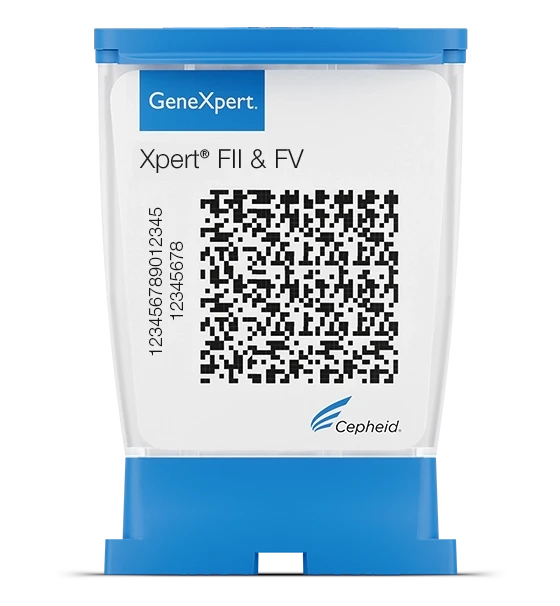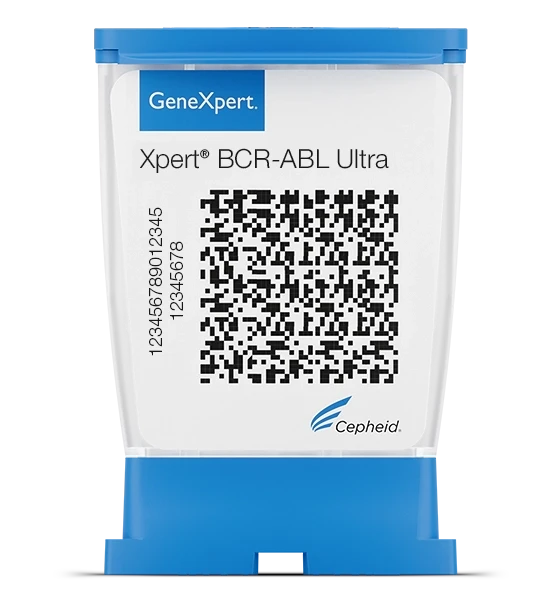
Xpert® FII & FV
30-Minute Test for Genetic Risk of Thrombosis
Sign in or create a MyCepheid account to add items to cart
Test pack size(s)

10 Tests
GXFIIFV-10
Qty
Unit price
Subtotal
USD
Product is not available for purchase in your region.
Total
{{currency}}
0
Error adding items to cart. If this error persists, please contact Digital Support
The Need
Thrombophilia is as an increased risk or tendency to develop blood clots (thrombi) in veins, arteries or both due to either inherited or acquired defects.1
The high incidence of venous thrombo-embolism (VTE) in hospitalized patients is a major cause of sudden death.1
Factor II and V are the two most common genetic variants associated with VTE and testing for these variants is one of the most common referral in clinical genetics laboratories.3
The high incidence of venous thrombo-embolism (VTE) in hospitalized patients is a major cause of sudden death.1
Factor II and V are the two most common genetic variants associated with VTE and testing for these variants is one of the most common referral in clinical genetics laboratories.3
- Heit J et al. The epidemiology of venous thromboembolism. J Throm Thrombolysis 2016 41: 3-14
- CDC. Accessed Aug 2020 https://www.cdc.gov/ncbddd/dvt/facts.html
- Zhang S, Taylor AK, Huang X, Luo B, Spector EB, Fang P, Richards CS; ACMG Laboratory Quality Assurance Committee. Venous thromboembolism laboratory testing (factor V Leiden and factor II c.*97G>A), 2018 update: a technical standard of the American College of Medical Genetics and Genomics (ACMG). Genet Med. 2018 Dec;20(12):1489-1498. doi: 10.1038/s41436-018-0322-z. Epub 2018 Oct 5. PMID: 30297698.
- Saquilayan M et al. Detection of genetic thrombophilia (Fa V Leiden & PT20210 mutation) using GeneXpert technology with IQCP implementation. Natural Sciences and Mathematics | Clinical Laboratory Sciences Culminating Projects. 2019. https://doi.org/10.33015/dominican.edu/2019.CLS.04
The Solution
The Xpert FII & FV is intended to provide results for Factor II mutation c.*97G>A (formally 20210G>A) and Factor V Leiden c.1601G>A (p.Arg534Gln) as an aid in the diagnosis of suspected thrombophilia.5
The test is a qualitative genotyping test for fast and simultaneous detection of Factor II and Factor V alleles in approximately 30 minutes.5
The test is a qualitative genotyping test for fast and simultaneous detection of Factor II and Factor V alleles in approximately 30 minutes.5
5 Xpert® Factor II & Factor V Kit Instructions for Use.
The Impact
- Potential to improve patient management and optimize lab workflow with fast test and accurate results that don’t require specialized lab personnel or facilities.4
- Delivers fast answers on the two main factors involved in VTE enabling timely clinical management.1-3
- Enables laboratories and clinicians to adhere to professional standards3
- Heit J et al. The epidemiology of venous thromboembolism. J Throm Thrombolysis 2016 41: 3-14
- CDC. Accessed Aug 2020 https://www.cdc.gov/ncbddd/dvt/facts.html
- Zhang S, Taylor AK, Huang X, Luo B, Spector EB, Fang P, Richards CS; ACMG Laboratory Quality Assurance Committee. Venous thromboembolism laboratory testing (factor V Leiden and factor II c.*97G>A), 2018 update: a technical standard of the American College of Medical Genetics and Genomics (ACMG). Genet Med. 2018 Dec;20(12):1489-1498. doi: 10.1038/s41436-018-0322-z. Epub 2018 Oct 5. PMID: 30297698.
- Saquilayan M et al. Detection of genetic thrombophilia (Fa V Leiden & PT20210 mutation) using GeneXpert technology with IQCP implementation. Natural Sciences and Mathematics | Clinical Laboratory Sciences Culminating Projects. 2019. https://doi.org/10.33015/dominican.edu/2019.CLS.04







